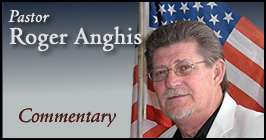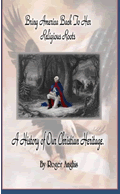POLITICAL SERMONS FROM PASTORS IN THE FOUNDING ERA
PART 5
By
Pastor Roger Anghis
August 25, 2013
NewsWithViews.com
Election sermon given by Pastor Samuel Cooke, A. E., Pastor of the Second Church in Cambridge, MA, May 30, 1770.
This sermon was given shortly after the “Boston Massacre” denouncing the abuse of power exhibited by the British government. This message was so powerful that the Massachusetts House of Representatives ordered the sermon to be printed and distributed.[1]
Foundation scripture
2
Samuel 23:3- The God of Israel said, the Rock of Israel spake to me,
He that ruleth over men must be just, ruling in the fear of God.
4- And he shall be as the light of the morning, when the sun riseth,
even a morning without clouds; as the tender grass springing out of
the earth by clear shining after rain.
In his sermon, Reverend Cooke begins with a description of how society is assembled, with good and bad influences and acknowledges that because of the differences there must be some kind of government that sets boundaries where boundaries need to be set. He also speaks of the absolute necessity of having virtuous men to execute the laws established for the purpose of a civil society.
“It is far otherwise when mankind are formed into collective bodies, or a social state of life. Here, their frequent mutual intercourse, in a degree, necessarily leads them to different apprehensions respecting their several rights, even where their intentions are upright. Temptations to injustice and violence increase, and the occasions of them multiply in proportion to the increase and opulence of the society. The laws of nature, though enforced by divine revelation, which bind the conscience of the upright, prove insufficient to restrain the sons of violence, who have not the fear of God before their eyes.
A society cannot long subsist in such a state; their safety, their social being," depends upon the establishment of determinate rules or laws, with proper penalties to enforce them, to which individuals shall be subjected. The laws, however wisely adapted, cannot operate to the public security unless they are properly executed. The execution of them remaining in the hands of the whole community, leaves individuals to determine their own rights, and, in effect, in the same circumstances as in a state of nature. The remedy in this case is solely in the hands of the community.”[2] (Emphasis mine)
Reverend Cooke expands this description by explaining what an individual’s role is in placing people in authority over them. This seems to be a subject that way too many preachers today simply ignore. By refusing to address this we have enabled corrupt men and women to take control of our government and are slowly taking our rights away from us.
“A society emerging from a state of nature, in respect to authority, are all upon a level; no individual can justly challenge a right to make or execute the laws by which it is to be governed, but only by the choice or general consent of the community. The people, the collective body only, have a right, under God, to determine who shall exercise this trust for the common interest, and to fix the bounds of their authority; and, consequently, unless we admit the most evident inconsistence, those in authority, in the whole of their public conduct, are accountable to the society which gave them their political existence. This is evidently the natural origin and state of all civil government, the" sole end and design of which is, not to ennoble a few and enslave the multitude, but the public benefit, the good of the people ; that they may be protected in their persons, and secured in the enjoyment of all their rights, and be enabled to lead quiet and peaceable lives in all godliness and honesty.”[3] (Emphasis mine)
Reverend Cooke points out the importance of the type of person that is put into authority. “The advantages of civil government, even under the British form, greatly depend upon the character and conduct of those to whom the administration is committed. When the righteous are in authority, the people rejoice; but when the wicked beareth rule, the people mourn. The Most High, therefore, who is just in all his ways, good to all, and whose commands strike dread, has strictly enjoined faithfulness upon all those who are advanced to any place of public trust. Rulers of this character cooperate with God in his gracious dispensations of providence, and under him are diffusive blessings to the people, and are compared to the light of morning, when the sun riseth, even a morning without clouds.”[4] (Emphasis mine)
Note must be taken considering this matter. Man has not established any form of government that can be administered by itself but requires men and women of integrity to execute the laws that God has deemed for us to follow. Without adhering to this principle of men and women of high character and virtue, the government our Founders began will only be a monument to their wisdom.
Reverend Cooke goes on to explain that those that rule over us are put there for one reason and one reason only ‘to be ministers of God for good.’ “This solemn charge given to rulers is not an arbitrary injunction imposed by God, but is founded in the most obvious laws of nature and reason. Rulers are appointed for this very end — to be ministers of God for good. The people have a right to expect this from them, and to require it, not as an act of grace, but as their unquestionable due. It is the express or implicit condition upon which they were chosen and continued in public office, that they attend continually upon this very thing. Their time, their abilities, their authority— by their acceptance of the public trust — are consecrated to the community, and cannot, in justice, be withheld ; they are obliged to seek the welfare of the people, and exert all their powers to promote the common interest.”[5]
I have stated many times in my books and columns that our Founders took special care to make sure that those that were placed in authority over them were men of high character. There is even a case where a judge was removed from office because he got drunk – in his own home! We can’t even get rid of a judge today that ignores our Constitution! Reverend Cooke defines the person placed in authority in great detail. How many politicians today can you say fits the requirements laid out by Reverend Cooke here: “This continual solicitude for the common good, however depressing it may appear, is what rulers of every degree have taken upon themselves ; and, in justice to the people, in faithfulness to God, they must either sustain it with fidelity, or resign their office.
| Subscribe to the NewsWithViews Daily News Alerts! |
The first attention of the faithful ruler will be to the subjects of government in their specific nature. He will not forget that he ruleth over men,— men who are of the same species with himself, and by nature equal, — men who are the offspring of God, and alike formed after his glorious image,—men of like passions and feelings with himself, and, as men, in the sight of their common Creator of equal importance, — men who have raised him to power, and support him in the exercise of it,— men who are reasonable beings, and can be subjected to no human restrictions which are not founded in reason, and of the fitness of which they may be convinced, — men who are moral agents, and under the absolute control of the High Possessor of heaven and earth, and cannot, without the greatest impropriety and disloyalty to the King of kings, yield unlimited subjection to any inferior power, —men whom the Son of God hath condescended to ransom, and dignified their nature by becoming the son of man, — men who have the most evident right, in every decent way, to represent to rulers their grievances, and seek redress.”[6] (Emphasis mine)
Click here for part -----> 1, 2, 3, 4, 5, 6,
Footnotes:
1.
Claude H. Van Tyne, The Causes of the War of Independence (Boston: Houghton
Mifflin Company, 1922), p. 362.
2.
Pulpit of the American Revolution, John W. Thorton, The Federalist Papers
Project, (Gould and Lincoln, Boston), pp. 160
3.
Pulpit of the American Revolution, John W. Thorton, The Federalist Papers
Project, (Gould and Lincoln, Boston), pp. 160-161.
4.
Pulpit of the American Revolution, John W. Thorton, The Federalist Papers
Project, (Gould and Lincoln, Boston), p. 164.
5.
Pulpit of the American Revolution, John W. Thorton, The Federalist Papers
Project, (Gould and Lincoln, Boston), p. 164.
6.
Pulpit of the American Revolution, John W. Thorton, The Federalist Papers
Project, (Gould and Lincoln, Boston), pp. 165-165.
� 2013 Roger Anghis - All Rights Reserved
Pastor Roger Anghis is the Founder of RestoreFreeSpeech.org, an organization designed to draw attention to the need of returning free speech rights to churches that was restricted in 1954.
President of The Damascus Project, TheDamascusProject.org, which has a stated purpose of teaching pastors and lay people the need of the churches involvement in the political arena and to teach the historical role of Christianity in the politics of the United States. Married-37 years, 3 children, three grandchildren.
Web site: RestoreFreeSpeech.org
E-Mail: editor@restorefreespeech.org














 Share
This Article
Share
This Article






